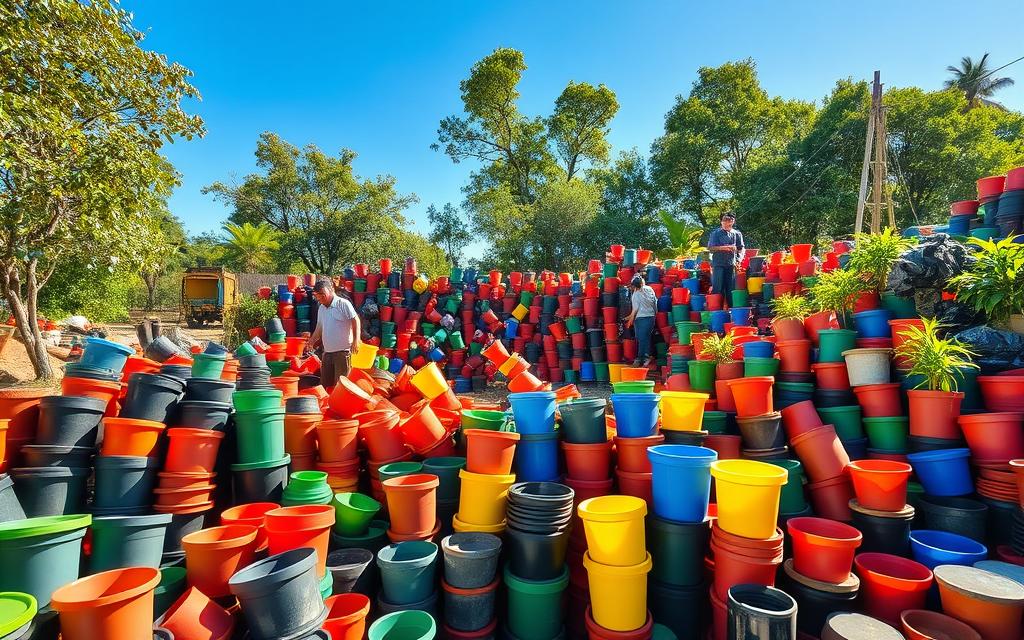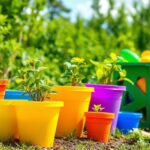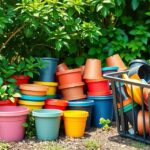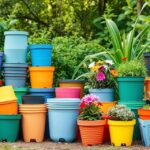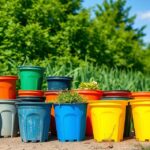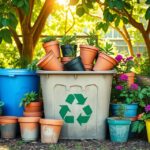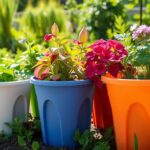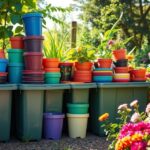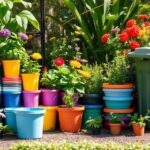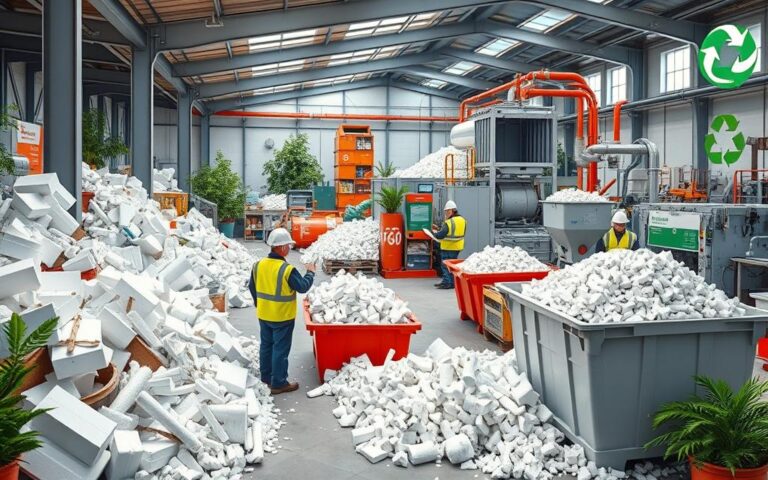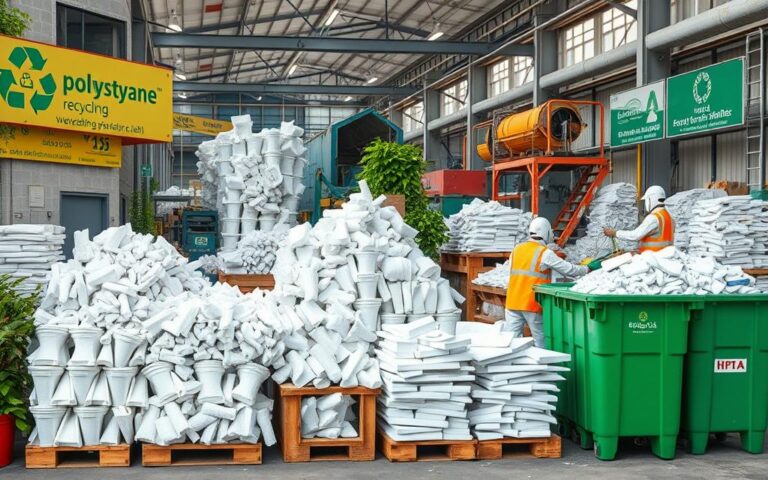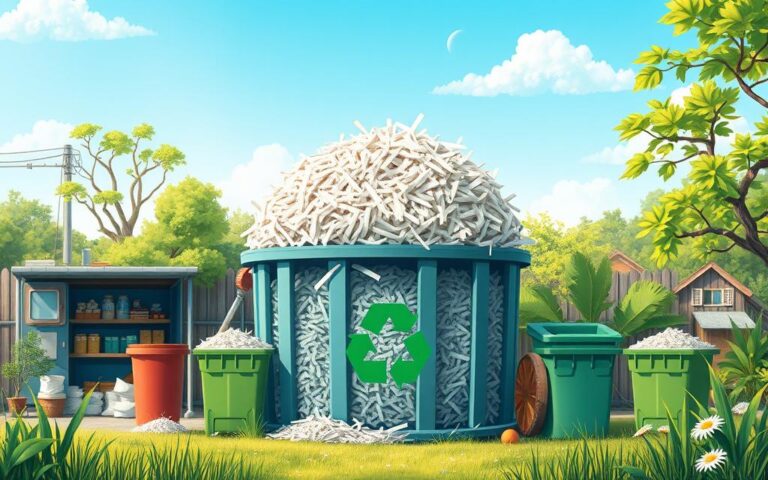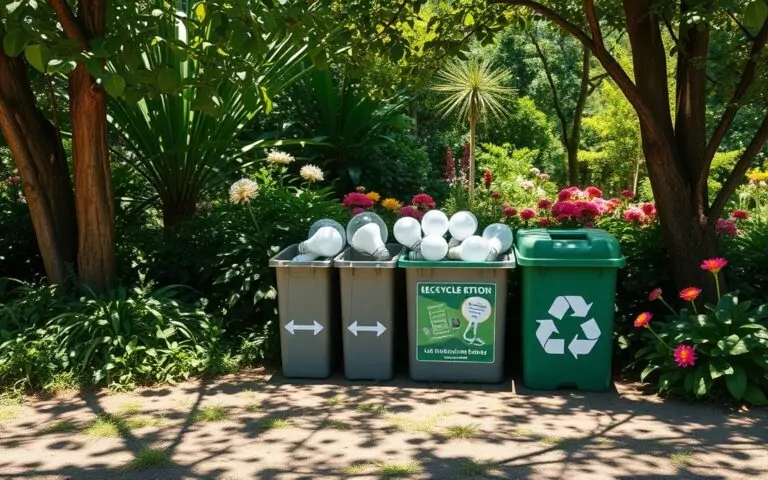Are Plastic Plant Pots Recyclable? How to Dispose of Them
As more gardeners choose eco-friendly ways, we wonder if plastic plant pots can be recycled. Millions of these pots enter UK gardens every year, creating disposal issues. They are mostly made from polypropylene and polyethylene, adding to plastic waste worries.
With the rise of sustainable gardening, knowing how to recycle these pots is crucial. This article will look into the plastics used in plant pots, their recycling, and eco-friendly disposal.
Understanding Plastic Plant Pots
Gardeners often use plastic pots for growing plants. It’s important to know about the types of plastic. This knowledge helps in cutting down waste and recycling better. Getting to know the types of plastic can help gardeners make better choices for their gardens.
Types of Plastic Used in Plant Pots
The most common types of plastic found in garden pots include:
- Polyethylene Terephthalate (PET) – often seen in clear containers, suitable for visibility but not always strong enough for reusability.
- Polypropylene (PP) – known for its durability and heat resistance, making it a popular choice for larger pots.
- Polystyrene (PS) – generally lightweight but less sturdy compared to other plastic types; often used in disposable pots.
Recycling these materials can be hard. The black plastic in many garden pots is hard to recycle. Sorting machines struggle to identify them due to their colour. Plus, leftover dirt can pollute the recycling process, making it less efficient.
Common Brands and Their Materials
Some brands stand out in the plastic garden pot market. They focus on looks and how functional the pots are. Famous brands include:
| Brand | Materials Used | Recyclability Status |
|---|---|---|
| Gardman | Polypropylene (PP) | Limited |
| Haxnicks | Polyethylene (PE) | More recyclable |
| Lechuza | Polypropylene (PP) | Partially recyclable |
Some information comes from the Association of Professional Landscape Designers. They highlight the problems with recycling garden plastic. Looking at how brands, like Jost Greenhouses, simplify their products can help. It reduces costs and manages resources better.
Are Plastic Plant Pots Recyclable?
Recycling plastic plant pots is quite a challenge. To properly dispose of them, understanding the recycling steps is crucial. Gardeners often look for ways to recycle plant pots. But they must be wary of issues, especially with black plastic pots.
The Recycling Process for Plant Pots
The recycling of plastic plant pots involves a few key steps. Sadly, these pots are mostly made from low-value plastics. This means they can’t be easily remade into new items. Many recycling places struggle because they can’t separate different plastics well.
Black plastic pots are especially tough for recycling centers. The tech used to sort plastics can’t detect them well. Thus, they are rarely recycled.
Black Plastic Pots and Their Recycling Challenges
Black plastic pots are common but hard to recycle. Their colour and dirt remnants make sorting difficult. This lowers the value of other recyclables. Furthermore, many places lack specific programs for recycling these pots.
In some areas, no public schemes for collecting these pots exist. This leaves gardeners with few options for disposal. Yet, some local programs might accept them, but availability varies.
The gardening world is trying to solve these problems. The APLD promotes the Healthy Pots – Healthy Planet program. It encourages using eco-friendly methods. Looking into alternatives like Ellepot, which uses compostable materials, can help. Learning about proper disposal and seeking new solutions can lessen the environmental harm of plastic in gardening.
How to Properly Dispose of Plastic Plant Pots
Disposing of plastic pots helps the planet and makes gardeners more responsible. There are many ways to do this. You can recycle them or start new projects with them.
Local Recycling Options for Plant Pots
Not everyone knows the best way to recycle plastic pots. The options depend on where you live. Some places let you recycle them with other items. Stores like Home Depot and Lowe’s also accept them.
Before recycling pots, clean them and remove all soil. This is important to avoid contaminating the recycling process. Remember, some places can’t recycle black plastic pots. However, #5 plastic pots can be turned into new products.
Repurposing Your Plastic Pots
Repurposing plastic pots is a great idea. It gives them a new life. You can use old pots to start seeds or store things.
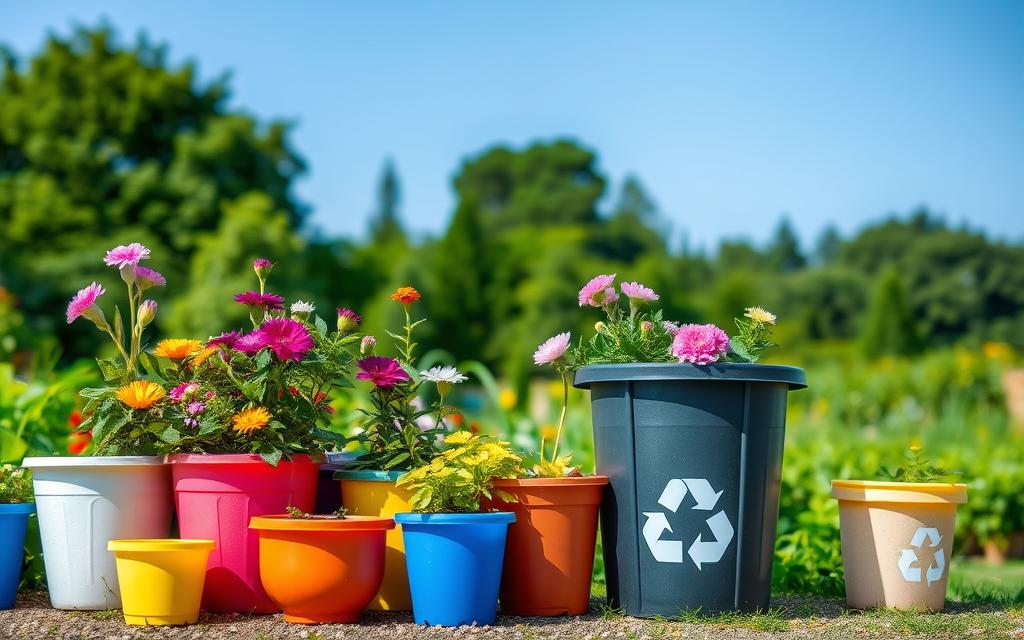
Donating to community gardens is another good option. It helps reduce waste and supports local projects. Repurposing can be fun and is good for the planet.
Learning the right way to dispose of plastic pots is important. It offers both environmental gains and new creative ideas. Every action we take can help make the earth a better place.
Eco-Friendly Alternatives to Plastic Plant Pots
There’s a big change happening in gardening towards eco-friendly choices. Gardeners are looking for ways to cut down on plastic use. At the same time, they want to boost plant health and sustainability. Choosing options that break down or can be composted is getting more popular as we all worry more about the planet.
Compostable and Biodegradable Options
There are many compostable pots that naturally break down. They also give good things to the plants as they decompose. Some include:
- Wooden seed trays: These get warm quickly, which helps roots grow strong. They can fit around 24 newspaper pots, making them very useful.
- Coir plant pots: Made from coconut husks, these pots help roots grow well. They do need more water because they dry out fast.
- Cardboard fibre pots: These pots are ready to use and break down fast. Be careful not to overwater them, or they’ll get slimy.
- Egg box pots: They’re cheap and break down fast. But they need watering often because they don’t hold moisture well.
- Cow poo pots: These unique pots dissolve when wet. Slugs like them, but they also feed plants as they break down.
Using Reusable Containers for Gardening
Using reusable containers is a smart move to cut down on single-use plastics. Gardeners can switch to:
- Homemade newspaper pots: They’re easy to make and recyclable. These pots are good for roots but not for seedlings that need a long time to grow.
- Coir pots: The Hairy Pot Company found plants grow well in coir pots instead of plastic. This shows plants can adjust fine.
Choosing eco-friendly options is good for both the environment and our gardens. In the UK alone, we use about 500 million plastic plant pots every year. By picking sustainable gardening practices, we can lessen plastic waste. This helps keep the soil and plants healthy.
Best Practices for Cleaning Plastic Plant Pots
Cleaning plastic pots well is key for recycling and keeping gardening eco-friendly. Learning the right cleaning ways helps avoid problems that could hurt recycling. Doing so makes sure your pots can be recycled more easily.
Cleaning Techniques to Prepare for Recycling
To get your plastic pots ready for recycling, here are some top tips:
- Start by giving the pots a good rinse with warm water to get rid of any leftover soil.
- For killing germs, mix one part bleach with nine parts water. Let the pots soak in it for a while.
- You can use rubbing alcohol as a less harsh germ killer if you prefer.
- Make sure to clean off any hard water marks or soil clinging to the pot edges to prevent recycling issues.
- Stay away from TSP cleaners for washing plant containers. They’re not suitable.
Avoiding Contamination in Recyclables
Keeping pots clean is crucial to ensure they can be recycled. Here’s how to dodge common recycling snags:
- Wash pots carefully before recycling. Dirty pots might get turned down by some cities.
- Find out what your local rules are for recycling pots. They can differ from place to place.
- You might try common disinfectants like Lysol or Clorox wipes, but their effectiveness against all germs isn’t sure.
Lowe’s makes it simpler with a Plastic Pot Recycling Program. This lets you bring back pots for reuse, no matter where you bought them. It’s a step towards more green gardening habits.
Conclusion
Understanding how to recycle plastic plant pots is key to greener gardening. In the UK, each person has about 39 unused pots. This means over 5 million pots could be sitting unused. It’s clear we need to adopt better ways to dispose of them. Ashortwalk’s recycling scheme is a good example of how to do this. They turn old pots into things like bird feeders, helping garden lovers help the planet.
Some garden centres and nurseries do take part in recycling schemes, but not enough of them. This makes it hard for people to know where to recycle their pots. Luckily, there’s a rise in events like seed swaps which help reuse these pots. It’s important to clean the pots well before recycling to avoid polluting the process. Right now, only a small part of all plastics is recycled.
We must pick eco-friendly options and support products made from recycled stuff. The gardening community is finding new ways to be more sustainable. By choosing smarter, we can lessen our environmental impact and enjoy our gardens more responsibly.
FAQ
Are all plastic plant pots recyclable?
Not all plastic plant pots are recyclable. Many plastics, like black plastic, are tough to recycle. This happens because recycling facilities often can’t see them properly. Always check local recycling rules to know what you can recycle.
How should I clean plastic plant pots before recycling?
Clean them with hot, soapy water and a bit of bleach. This kills any lingering germs. Make sure the pots are well rinsed and dry before you recycle them so they don’t contaminate other items.
What are some eco-friendly alternatives to plastic plant pots?
You can choose pots made from plant fibres or paper. They’re compostable and better for the earth. Reusing containers also cuts down on plastic waste and helps the planet.
Where can I find local recycling options for plastic plant pots?
Check with garden centres and home improvement stores near you. Places like Home Depot and Lowe’s often have recycling bins for pots. For exact details, talk to your local waste authority.
What types of plastic are commonly used in plant pots?
Plant pots mostly come in polyethylene (PET), polypropylene (PP), and polystyrene (PS). Each type has unique recycling needs. Knowing them helps in disposing of pots the right way.
Can I reuse plastic plant pots for other gardening purposes?
Absolutely. Use old pots for seed starting, storing tools, or keeping small items. It’s a great way to reuse them and support a greener garden.
How do I avoid contamination in recycling plastic pots?
Clean them well to remove dirt, plants, and residues. Doing this makes recycling more effective. It’s a key step for eco-friendly gardening.
What are the challenges associated with recycling black plastic pots?
Black pots are hard to recycle because they’re not seen by optical sensors at facilities. They often end up in landfills. Knowing how to dispose of them properly is crucial.

